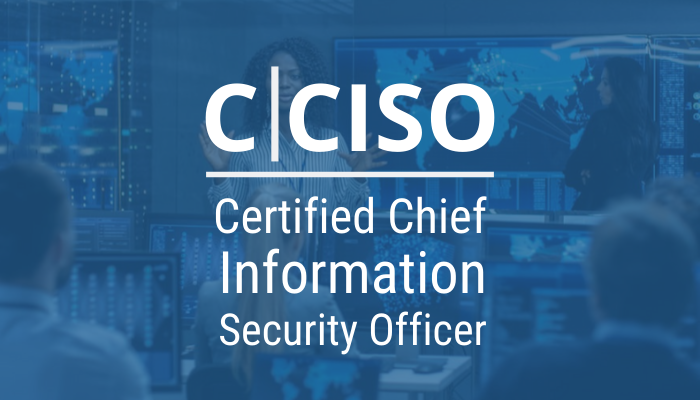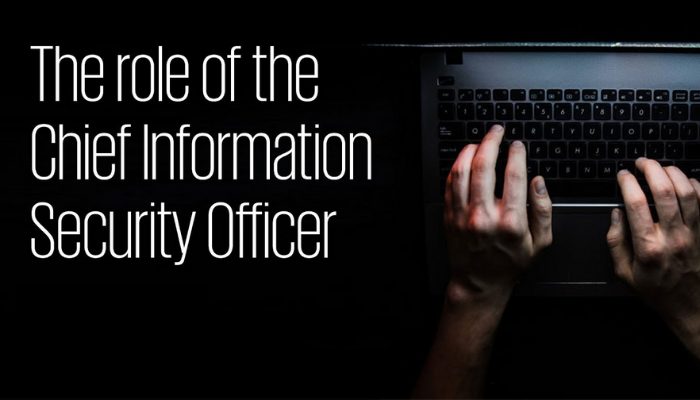The EC-Council Certified Chief Information Security Officer (CCISO) certification is designed to qualify middle managers up to the level of Executive Leaders. The EC-Council CCISO certification was developed to qualify the next generation of leaders.
This certification is not a technical one but a leadership course designed especially for seasoned InfoSec professionals, and it delves deep into outlines taken from the experience of the CISOs who worked for the building of CCISO syllabus.
The CCISO certification qualifies individuals who are looking to move forward from middle management to the executive positions by concentrating on high-level management skills particularly required for IS executives. From project to audit management, procurement, and finance, to plan and policy, applicants will be equipped with steer complex security applications strategically and successfully.
Targeted Audience for CCISO Certification for
If you are an executive looking to sharpen your skills & learn better to line up information security programs to the goals of the organization – than EC-Council CCISO certification is for you!
Certified Chief Information Security Officer – CCISO is more likely to be productive when they are respected and renowned within their organization or able to network and develop positive relationships regardless of stature quickly. An insight into the business and a skill to communicate about security, risk, and compliance problems are significant.
Top 7 Qualities of EC-Council CCISO: Certified Chief Information Security Officer
Strong security leadership demands a broad spectrum of skills and attributes, not all of which are technical. Keeping in mind the difficulties on the way, let’s break down seven key qualities of an effective Certified CISO.
1. Executive Presence and Leadership:
Powerful security leaders project executive authority in coordinating, administering, developing, planning, staffing, managing, and monitoring all security-related operations. They supervise the information security program and its coordination with additional programs, for example, risk management, privacy, compliance, physical security, purchasing, internal audit, human resources, and legal counsel, and integrate thoroughly with business and IT. Some CISOs contest to communicate efficiently with business leaders, especially when it catches up to risk and compliance topics, but they must be able to justify these topics to the business in words they can understand and eventually build credibility and trust.
2. CCISO Owns Strategy and Program Planning Skills
Strong CISOs maintain the focus and leadership behavior to guide, encourage, inspire, listen to and influence others within the organization to help the organization accomplish its security objectives. They mindfully develop plans with both short-term (e.g., annual) and long-term (e.g., three-year) planning horizons. Set up a process to determine set priorities, strategy, and create operational plans is one of the most important steps a CISO must take to ensure the security program is useful and adequately aligned with the company’s goals.
Read: Top Reasons To Go For Ec-Councils CCISO Certification Program
3. Security Expertise and Commitment to Self-Development
Achieving the objective of an information security program demands a Certified Chief Information Security Officer – CCISO with profound skills and qualities. Certified CISOs should have a strong basis of security knowledge to gain because they are adapted to decide or recommend the organization’s position on most, if not all, information security problems. They should also hold powerful analytical and problem-solving skills to understand and implement abstract concepts to practical problems. Ultimately, security leaders should have at least ten years of experience in the security profession and five to seven years of direct experience in maintaining a program.
4. Communication, Representation, and Documentation
Information security is quite multi-disciplinary and interdepartmental, and it needs a variety of skill sets to be productive. Simply put, security is a teamwork and must be regulated as such. A successful CISO is one that acknowledges that information security is a constant and open-ended business procedure that needs buy-in from individuals and teams across the company.
5. A Brain for Metrics
The development of security metrics can vary significantly, but CCISOs should build formal metrics programs to understand better how the security operation is implementing and developing. They should also carry out intermittent benchmarking with industry peers to analyze plans and analytics.

6. Aptitude to Govern by Influence Rather Than Order
CCISO perceives that they have a compliance responsibility, but usually prefer not to be perceived as the person whose work is to say no. The favored way is to govern by influence instead of order. The security leader might, for instance, develop a team of internal risk consultants who are available to help other business units conduct vulnerability assessments and design security policy. This leads to the difference between raising a control-centric relationship with non-IT departments and assisting others in managing the organization’s information risk.
7. Relevant Organizational Placement
The basic responsibility for organizing the different activities that help the information security program set upon the CISO, who usually reports to another C-level executive, most preferably the CEO. More often than not, on the other hand, the CISO reports to the CIO, chief financial officer (CFO), or chief technology officer (CTO). Organizational placement differs by organization, but the most affluent security leaders are treated with honor and imparted the latitude to deal with security-related people, processes, and technology issues with authority.

In Summary
CCISO understands they can’t simply take security, privacy, and risk and simmer it down to a simple, standard method. Every organization is distinct. Therefore, a Certified Chief Information Security Officer can’t put security controls in place just for the sake of having security controls. Rather, they must have pointed out their organization so they can totally understand the special business problems they face and solve them appropriately. A CISO is charged with establishing the best vehicle to maintain the organization’s information security challenges from top to bottom.


